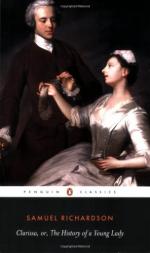John Williams,
Arthur Bedall,
Elizabeth Swanton.
LETTER XXXIV
Colonel Morden, to John Belford,
Esq.
Sat. Sept. 16.
I have been employed in a most melancholy task: in reading the will of the dear deceased.
The unhappy mother and Mrs. Norton chose to be absent on the affecting occasion. But Mrs. Harlowe made it her earnest request that every article of it should be fulfilled.
They were all extremely touched with the preamble.
The first words of the will—’I, Clarissa Harlowe, now by strange melancholy accidents, lodging,’ &c. drew tears from some, sighs from all.
The directions for her funeral, in case she were or were not permitted to be carried down; the mention of her orders having been given for the manner of her being laid out, and the presence of mind so visible throughout the whole, obtained their admiration, expressed by hands and eyes lifted up, and by falling tears.
When I read the direction, ’That her body was not to be viewed, except any of her relations should vouchsafe, for the last time, to look upon her;’ they turned away, and turned to me, three or four times alternately. Mrs. Hervey and Miss Arabella sobbed; the uncles wiped their eyes; the brother looked down; the father wrung his hands.
I was obliged to stop at the words, ‘That she was nobody’s.’
But when I came to the address to be made to the accursed man, ’if he were not to be diverted from seeing her dead, whom once before he had seen in a manner dead’——execration, and either vows or wishes of revenge, filled every mouth.
These were still more fervently renewed, when they came to hear read her forgiveness of even this man.
You remember, Sir, on our first reading of the will in town, the observations I made on the foul play which it is evident the excellent creature met with from this abandoned man, and what I said upon the occasion. I am not used to repeat things of that nature.
The dear creature’s noble contempt of the nothing, as she nobly calls it, about which she had been giving such particular directions, to wit, her body; and her apologizing for the particularity of those directions from the circumstances she was in—had the same, and as strong an effect upon me, as when I first read the animated paragraph; and, pointed by my eye, (by turns cast upon them all,) affected them all.
When the article was read which bequeathed to the father the grandfather’s estate, and the reason assigned for it, (so generous and so dutiful,) the father could sit no longer; but withdrew, wiping his eyes, and lifting up his spread hands at Mr. James Harlowe; who rose to attend him to the door, as Arabella likewise did——All he could say—O Son! Son!—O Girl! Girl!—as if he reproached them for the parts they had acted, and put him upon acting.




